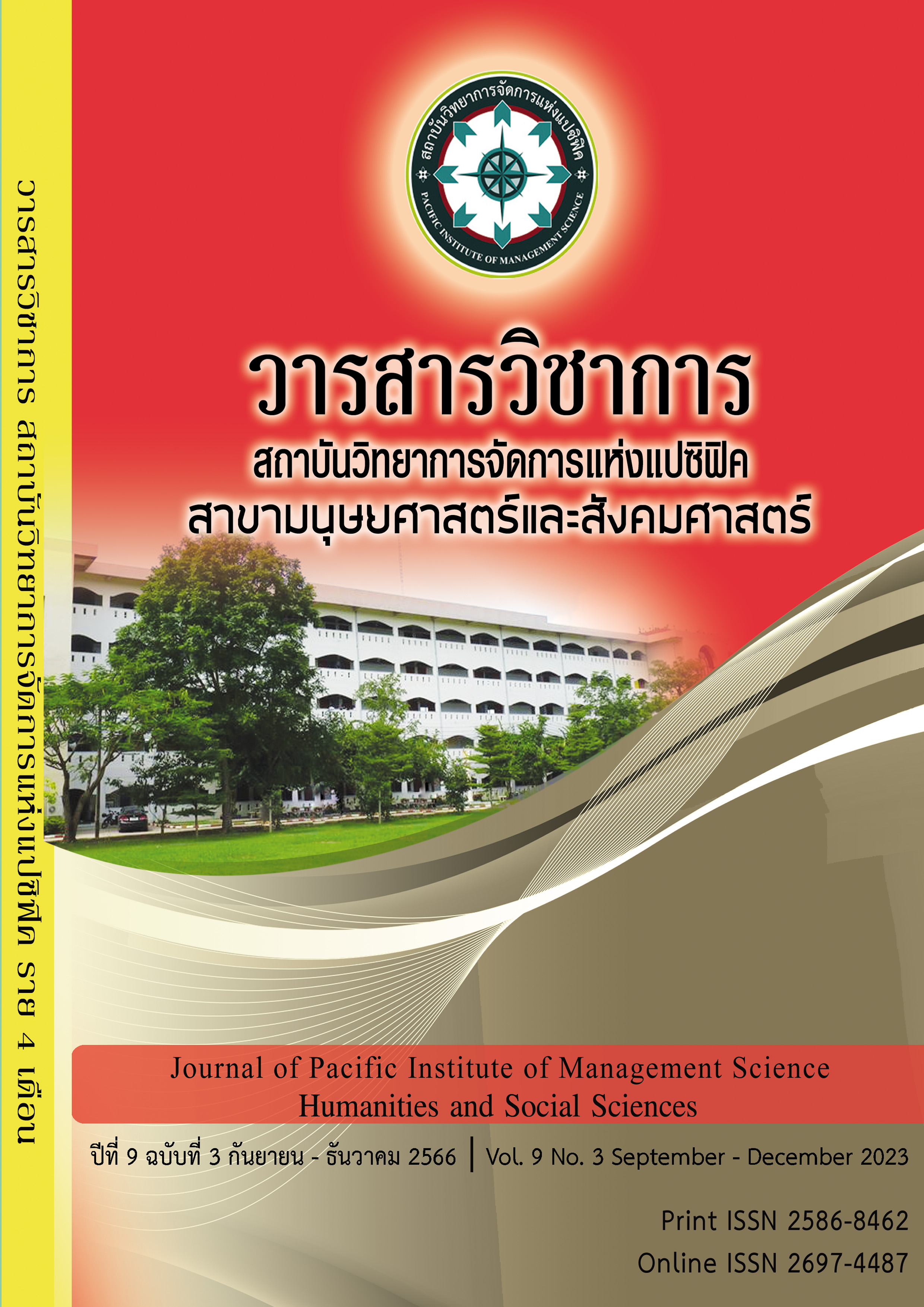The Causal Factors Influencing Customer Loyalty for Self Service Technology of Commercial Bank in Thailand
Keywords:
Self-Service Technology, Technology Acceptance, Electronic word-of-mouth, Intention, Trust, LoyaltyAbstract
This research is a quantitative research. The objectives of this study were (1) to study the influence of causal factors on customer intention and trust in using self-service technology services of commercial banks in Thailand; (3) To develop a structural equation model of causal factors influencing customer loyalty using self-service technology (SST). of commercial banks listed on the Stock Exchange of Thailand The sample group was 400 customers using self-service technology (SST) using convenience random sampling. The tool used was a questionnaire. Implementation of mixed model research according to a convergent-parallel approach. The study found that Use intentions are directly influenced by the quality of technology implementation. technology acceptance and electronic word-of-mouth communication The predictive coefficient of intention to use was 45.2%. Trust was directly influenced by quality of use of technology, acceptance of technology and electronic word-of-mouth communication There was a predictive coefficient of intent to use 56.8%, and customer loyalty directly influenced by technology implementation quality technology acceptance intention to use and trust, with a predictive coefficient of loyalty of 84.5 percent, but customer loyalty not directly influenced by electronic word-of-mouth communication at the significance level of 0.05.
The results of the analysis of the structural equation model were developed and found that it was consistent with the empirical data. Qua-square per degree of freedom was 1.308, p-value was 0.052, CFI was 0.995, GFI was 0.975, RMSEA was 0.028, RMR was 0.007, which theoretically explained that the aforementioned structural equation model was consistent with the theoretical model that set at an acceptable level.
References
ธนภรณ์ แสงโชต. (2561). การยอมรับเทคโนโลยีทางการเงิน กรณีศึกษา เทคโนโลยี MyMo Mobile Banking บริบท ธนาคารออมสิน. (วิทยานิพนธ์วิทยาศาสตร์มหาบัณฑิต สาขาวิชาการบริหารเทคโนโลยี วิทยาลัยนวัตกรรม, มหาวิทยาลัยธรรมศาสตร์).
ปาลิณี ตีรบุลกุล. (2560). ปัจจัยที่มีอิทธิพลต่อความตั้งใจในการกลับมาใช้ซ้าและความตั้งใจในการบอกต่อคราวด์ซิ่งที่มีการผสมผสานเกม. วิทยานิพนธ์. จุฬาลงกรณ์มหาวิทยาลัย. กรุงเทพฯ.
วริษฐา สุริยไพฑูรย์. (2560). อิทธิพลของการรับรู้ประโยชน์และความง่ายในการใช้งานที่ส่งผลต่อ ทัศนคติและความตั้งใจซื้อสินค้าแฟชั่นของผู้บริโภคผ่านระบบพาณิชย์บนโทรศัพท์เคลื่อนที่. วิทยานิพนธ์ บริหารธุรกิจมหาบัณฑิต. สงขลา : มหาวิทยาลัยสงขลานครินทร์.
Ala’ Omar Dandis.(2021). Enhancing consumers’ self-reported loyalty intentions in Islamic Banks: The relationship between service quality and the mediating role of customer satisfaction. Cogent Business & Management. doi.org/10.1080/23311975.2021.1892256
Ayodeji, Y., & Rjoub, H. (2021). Investigation into waiting time, self-service technology, and customer loyalty: The mediating role of waiting time in satisfaction. Human Factors and Ergonomics in Manufacturing & Service Industries, 31(1), pp. 27-41.
Davis, F. (1989). A technology acceptance model for empirically testing new end user information systems: Theory and results. Unpublished doctoral dissertation, MIT Sloan School of Management, Cambridge.
Davis, F. (1989). Perceived usefulness, perceived ease of use, and user acceptance of information technology. MIS Quarterly, 13(3), pp. 319–340.
Delone, W. H., & McLean, E. R. (2003). The DeLone and McLean model of information systems success: A ten-year update. Information System, 19(4),pp. 9–30.
Dudi Amarullah al et.,(2022). EWOM Credibility, trust, perceived risk, and Purchase intention in the context of e-Commerce: moderating role of online shopping experience. Jurnal Ekonomi Bisnis dan Kewirausahaan (JEBIK) 2022, Vol.11, No.1, 61-83
Miftahul Rizmi(2021). The effect of e-wom on purchase intention through attitude with sovc as a moderating variable on the followers of instagram account. International Journal of Business Management and Economic Review Vol. 4, No. 04; 2021
Muhammad Shahid Iqbal al et.,.(2018). Impact of self-service technology (SST) service quality on customer loyalty and behavioral intention: The mediating role of customer satisfaction. Business & Management.doi:10.1080/23311975.2018.1423770
Nguyen Xuan Tho.(2020). Receiving Positive Word of Mouth & Spreading Positive Word of Mouth: The Role of Trust. Journal of Business Administration and Education. ISSN 2201-2958 Volume 12, 2020, 4
Rahman, F., & Soesilo, P. K. M. (2018). The Effect of Information Exposure of Contract Manufacturing Practice on Consumers’ Perceived Risk, perceived Quality, and Intention to Purchase Private Label Brand. Journal of Retailing and Consumer Services, 42, 37–46. https://doi.org/10.1016/j.jretconser.2018.01.010
Thanh D. Nguyen al et.,(2019). Intention to Use M–Banking: The Role of E–WOM. Springer Nature Switzerland AG 2020 ISDA 2018, AISC 940, pp. 215–229, 2020.
Tien, D. H., Amaya Rivas, A. A., & Liao, Y. K. (2019). Examining The Influence of Customer-to-Customer Electronic Word-of-Mouth on Purchase Intention in Social Networking Sites. Asia Pacific Management Review, 24(3), 238–249.
Zhao, Y., Wang, L., Tang, H., & Zhang, Y. (2020). Electronic Word-of-Mouth and Consumer Purchase Intentions in Social E-Commerce. Electronic Commerce Research and Applications 41,doi :10.1016/j.elerap.2020.100980.
Downloads
Published
Issue
Section
License
Copyright (c) 2023 Pacific Institute of Management Science

This work is licensed under a Creative Commons Attribution-NonCommercial-NoDerivatives 4.0 International License.
บทความที่ได้รับการตีพิมพ์เป็นลิขสิทธิ์ของ สถาบันวิทยาการจัดการแห่งแปซิฟิค
ข้อความที่ปรากฏในบทความแต่ละเรื่องในวารสารวิชาการเล่มนี้เป็นความคิดเห็นส่วนตัวของผู้เขียนแต่ละท่านไม่เกี่ยวข้องกับสถาบันวิทยาการจัดการแห่งแปซิฟิค และคณาจารย์ท่านอื่นๆในสถาบันฯ แต่อย่างใด ความรับผิดชอบองค์ประกอบทั้งหมดของบทความแต่ละเรื่องเป็นของผู้เขียนแต่ละท่าน หากมีความผิดพลาดใดๆ ผู้เขียนแต่ละท่านจะรับผิดชอบบทความของตนเองแต่ผู้เดียว







